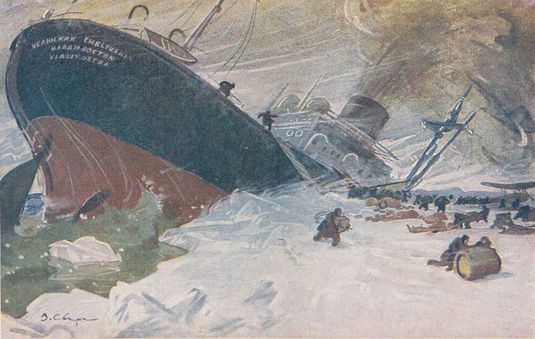An Anatomy Lesson of Narrated Adventure. Theorizing Adventure Literature in the Early Soviet Union
Slavonic Studies, LMU Munich
Principal Investigator: Prof. Dr. Riccardo Nicolosi
Research Staff: Dr. Anke Hennig and Dr. Brigitte Obermayr

Vasilij Svarog, Der Untergang der Čeljuskin (1943)
The project explores the dimensions of narrated adventure in early Soviet literature (from the 1920s to the 1940s) in terms of literary theory, fiction and cultural politics. In exploring these strands the project takes as its starting point the hypothesis that the analysed artefacts may be regarded as an ‘anatomy lesson‘ of narrated adventure: the material exposes and, indeed, analyses central issues of narrated adventure. The examined period is divided into two stages. The first decade (1920–1930), being dominated by avantgardistic aesthetics, is characterized by a prevalence and popularity of narrated adventure that is unique in the context of European modernism. In the second decade (1930–1940), under the conditions of the formation of Socialist Realism, on the contrary, adventure loses acceptance due to changing issues in cultural politics and seems to disappear. Against this assumption the project aims to show in which forms, that have so far been unconsidered, narrated adventure is persisting as well as participating in the formation of Socialist Realism. In proving such persistence and participation, the project aims to contribute to a modified view on the period of transformation from early Soviet style into Stalinistic monumentalism. Thus, the project is based on the working thesis that adventure participates in the formation of the new socialist type of human being, and, likewise, seems to persist in films showing “adventure-expeditions” that explore the new Soviet reality and test ways of depicting it. Finally, narrated adventure seems to provide fundamental structures in early Socialist Realist hybrid genres such as collective books or documentary novels.

